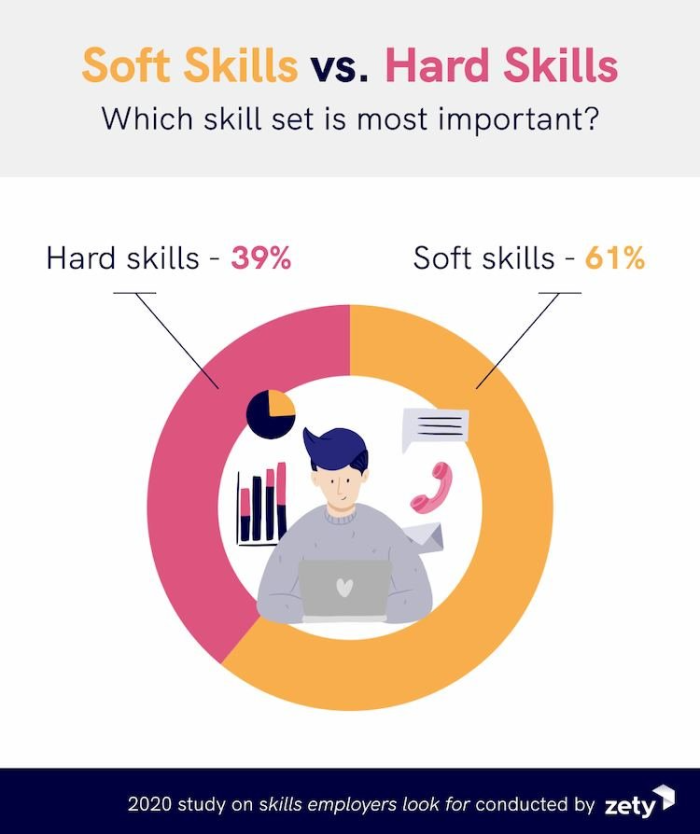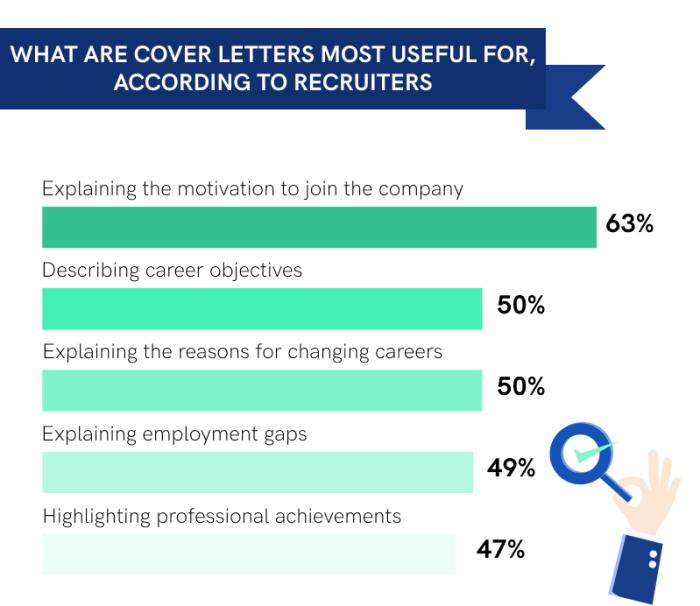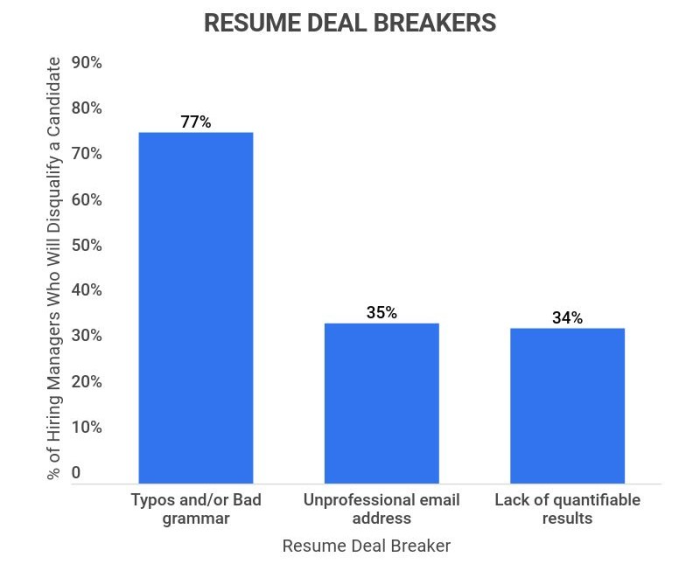6 Tips For Writing A Cover Letter That Promotes Your Academic Success
 Publié le 28 April 2023
Publié le 28 April 2023
As a new graduate, get the attention of hiring managers with 6 tips for writing a cover letter that promotes your academic success.
You know how important it is to send your CV or resume when applying for a job. But what about a cover letter?
According to a recent survey by ResumeLab, three-quarters of recruiters prefer a cover letter as well as a CV. For recent graduates looking to enter the job market, a good cover letter is your chance to expand on your CV and show your academic achievements and expertise.
Despite this, only four out of 10 candidates send a cover letter with their application, even when requested in the job posting! So, a well-written cover letter can put you ahead of the game.
In this post, we’ll discuss 6 tips for writing a cover letter that promotes your academic success:
- Tailor your letter to a specific role
- Paint a picture of your skillset
- Highlight your achievements
- Talk about your side hustles
- Support your successes with facts
- Remain professional throughout
1. Tailor your cover letter to a specific role
Before writing your cover letter, read the job description and note the specific qualities they’re looking for from applicants. You can then tailor your letter accordingly to include these keywords and phrases.
For example, if they’re hiring for a role related to fundraising, write about the grants you’ve secured as part of your academic career. Or, if they want someone with good writing skills, talk about the research papers you’ve published.
Also, research the institution or company that’s advertising the role. Look at their website, social media pages, and LinkedIn profiles and ask questions like:
- Who is the organization’s recruitment manager? (Who are you writing to?)
- What are the organization’s values?
- What is their culture?
- What sort of tone do they use in their written communication?
This will help you personalize your letter to the organization you’re applying to.
2. Paint a picture of your skillset
Your cover letter is your chance to give examples of your skills in action—outside of a formal skills assessment. Showcasing how your skills fit the role can help you move to the next stage in the hiring process.
Read through the job posting and pick three or four of the desired skills that you have. Then, provide an example of how you used that skill in your previous role. Even as a new graduate, you still have valuable entry-level skills that you can bring into the workplace.
For instance, if you want to demonstrate your teamwork skills, give an example of a group project you excelled at during your schooling. Successfully working in group projects requires organization, collaboration and even leadership abilities, which will be desired capabilities in any workplace.
Give examples of your soft skills as well as hard skills. According to Zety, 61% of recruiters consider soft skills more important than hard skills.

Image sourced from Zety
Soft Skills
Soft skills are social and cognitive skills, such as time management, communication, and teamwork. Soft skills are harder to teach than hard skills, so they’re currently in high demand.
According to the survey by Zety, teamwork and communication are the top two soft skills recruiters look for from job applicants. So, be sure to give examples of these skills in your cover letter.
For instance, instead of saying, “I have excellent communication skills,” give an example of your verbal or written skills in action. This could be a presentation you gave or a published research paper where you distilled complex ideas into smaller components that made for more straightforward understanding.
Hard Skills
Hard skills are skills you’ve learned during your career, such as legal expertise, project management, or engineering.
A 2023 survey found that IT and data skills are the most in-demand hard skills globally. So, if you have experience with data analysis, cloud computing, or digital software, for example, be sure to give examples of how you used it.
For instance, many organizations use cloud HR software to streamline their HR processes, manage their staff, and make more informed business decisions. If you have experience with such software during any volunteer or part-time job, talk about how you used its insights to organize roles or improve the onboarding process on your cover letter.
3. Highlight your achievements
According to ResumeLab’s survey, around 50% of recruiters say cover letters are important for highlighting professional achievements. So, include a section that promotes your academic achievements and qualifications as well. You’ve worked hard for these achievements and they deserve just as much attention.
You could talk about awards you’ve won, results you’ve achieved, or discoveries you’ve made.
Tailor your achievements to the qualifications in the job description. For instance, say the job description asks for X years of experience as a project manager. Mention how long you’ve been a leader in an academic setting and give an example of successful projects you’ve overseen.

Image sourced from ResumeLabs
4. Talk about your side hustles
Your cover letter is also a great place to talk about any side hustles and part-time work you have performed while in school, like an online store or consultancy work. Briefly describe what you do, what you’ve achieved, and the skills you’ve developed.
For example, being your own boss requires excellent time management and communication skills, which—as we’ve said—are in high demand. In order to balance their academic career, many students have multiple part-time jobs. This is demonstrable proof of your ability to organize your time and meet multiple simultaneous demands.
Also, give evidence of your successes, such as sales, growth, and revenue statistics from your side hustles and part-time gigs whenever possible. You should have these figures to hand, and this process can be made much easier through the use of accounting software.
Sole trader accounting software lets you view your accounts in real-time, track money in and out, and forecast your future cash flow. You’ll be able to pull insights from this software highlighting how well you’ve done outside of your academic achievements and include in your cover letter that promotes your academic success.
5. Support your successes with facts
We’ve touched on this already, but providing facts and figures to support your statements is vital when writing a cover letter that promotes your academic success
Statistics show recruiters you’ve made a measurable impact in your role, so include numbers and percentages where possible. If you consistently achieved top grades during your academic career, mention it! If you’re applying for a software engineering role, give the programming languages and systems you’ve used, along with any and all certifications.
Make it clear if you’re providing an estimate, and don’t guess. You have to be able to provide evidence if asked—whether that’s a company report or your own calculations.
6. Remain professional throughout
Finally, although you should tailor the tone of your cover letter to match the organization, you should also stay professional. Avoid slang and colloquialisms, and address the letter formally. Even if a company’s online presence is very casual and based in humor, it’s also best to avoid humor, as it may fall flat.
You also need to ensure your spelling, grammar, and punctuation is spot-on, especially if you’re applying for a role where attention to detail is paramount. Common signs of a weak resume are spelling mistakes and bad grammar, and it’s the same for cover letters.
Remember, a cover letter doubles as a writing sample. So, it’s crucial to get it right. Ask someone to review your draft or check it with an app like Hemingway or Grammarly.

Image sourced from zippia.com
A chance to showcase your achievements
A cover letter is your opportunity to show your academic success and make a great first impression on a potential employer. Be proud of your achievements, and don’t be afraid to showcase your talents.
The best cover letters are personalized to each role and provide quantifiable evidence of your skills and achievements, including side hustles. By following 6 tips for writing a cover letter that promotes your academic success, you can write an academic cover letter that helps you stand out from the competition and land your dream role.







